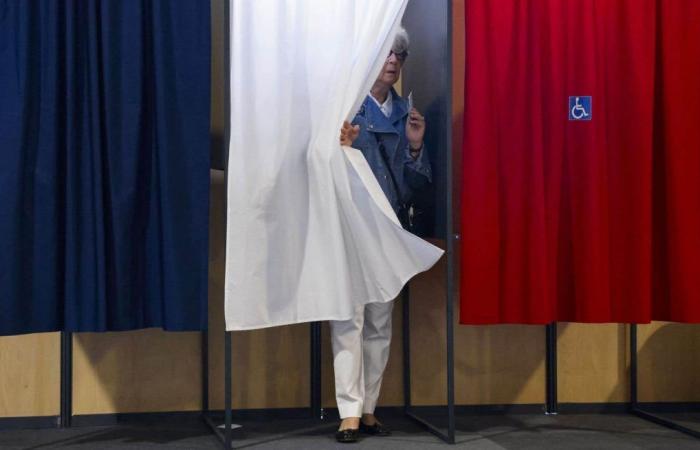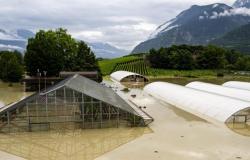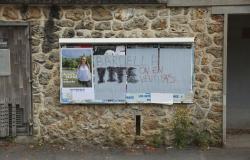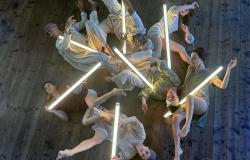The French voted massively on Sunday for the first round of historic legislative elections, which could pave the way for the far right to come to power in a week.
The turnout rate had already reached 59.39% in metropolitan France at 5 p.m. (11 a.m. in Quebec), 20 points more than in the first round of the 2022 legislative elections at the same time, the Interior Ministry announced.
It is also the highest rate since the first round of 1978, with the exception of the 1986 election which took place in one round.
In the polling stations, many voters expressed their anxiety and excitement for these elections called after the shock decision of President Emmanuel Macron to dissolve the National Assembly on June 9, on the evening of European elections marked by defeat. of his camp and the triumph of the extreme right.
“I would like to find some serenity because, since the European elections, everything has taken on a worrying scale,” confides Roxane Lebrun, 40, in Bordeaux, in the southwest.
In the northern districts of Marseille, a large port on the Mediterranean, which has a large population of immigrant origin, Nabil Agueni, 40, traveled even though he had not gone to the polls in the European elections: “As long as we have the choice, it’s better to go and vote,” he slips.
At the end of the day, participation in France should be between 67.5% and 69.5% according to the various polling institutes. It will therefore be significantly higher than the 47.51% of 2022 and could exceed the 67.9% of the last legislative elections following a dissolution in 1997.
The RNs please
Many political figures went to vote in the morning.
Emmanuel Macron did it in Le Touquet, in the northwest of France, allowing himself a long crowd bath with selfies and hugs.
The leader of the National Rally (RN, far right) Marine Le Pen voted in Hénin-Beaumont, in the north.
The French can vote until 6 p.m. (noon in Quebec) or, in large cities, until 8 p.m. (2 p.m. in Quebec), the time at which the first results of this vote likely to shake up the political landscape will emerge. .
The first figures from the French West Indies have already been released: an RN candidate will contest the second round of the legislative elections in Martinique, a first on this island, even if his score of less than 10% leaves little doubt about the outcome of the vote. .
Prime Minister Gabriel Attal will make a statement at the headquarters of the presidential Renaissance party after 8 p.m. (2 p.m. in Quebec), according to his entourage.
Embodied by its president Jordan Bardella, 28 years old, the RN is credited with 34% to 37% of voting intentions, with the unprecedented prospect of a relative or absolute majority on July 7, the evening of the second round.
According to the polls, which should be taken with caution, the RN should come out ahead of the left-wing alliance of the New Popular Front (NFP), given at between 27.5 and 29% and the presidential camp (centre right), with 20 to 21%.
A pari risqué
If Jordan Bardella becomes prime minister, it would be the first time that a government from the far right has led France since World War II, during which an unelected collaborationist regime was installed.
Otherwise, the risk of a blocked Assembly, with no possibility of an alliance between very polarised camps, is real, a scenario which would plunge France into the unknown.
An ultra-risky bet, the dissolution decided by Emmanuel Macron caused a political earthquake and plunged the country into uncertainty.
Despite its internal differences, the left managed to conclude a coalition agreement in the following days.
But the disagreements between the radical left group La France Insoumise (LFI) and its partners (socialists, ecologists, communists), particularly over the contested figure of the former LFI candidate in the presidential election Jean-Luc Mélenchon, have quickly resurfaced and parasitized their countryside.
Meanwhile, nothing seemed to slow down the RN’s momentum in the campaign on purchasing power and against immigration: neither the vagueness over the repeal of Mr. Macron’s pension reform, nor the emotion caused by Mr. Bardella’s desire to exclude dual nationals from “strategic jobs”, nor the sulphurous remarks of certain RN candidates.
The lessons of the first round could, however, be difficult to draw, in particular due to the large number of triangulars – three candidates qualified for the second round.
But also another unknown: the number of withdrawals between the two rounds, the practice of the “republican front” to obstruct the extreme right having weakened over the years.
“Greatest clarity”
The pressure is strongest among the “Macronists”, Emmanuel Macron having been elected head of state by posing, in 2017 and then in 2022, as a bulwark against the extreme right.
On Thursday he promised “the greatest clarity” on the attitude to follow, but so far seemed to be leaning towards a “neither RN nor LFI” position, which has been criticised even within his own camp.
Monday at midday, he will bring together the Prime Minister and other members of the government to establish a strategy against the far right.
These legislative elections are taking place after two years of relative majority in the Assembly, where the presidential camp had to seek allies text by text or resort to an article of the Constitution allowing budgets and pension reform to be passed without a vote.
The triumph of the RN in the European elections – 31.4% of the votes against 14.6% in Mr. Macron’s camp – precipitated events and the president’s choices, to the point of exposing him to possible “cohabitation” with Mr. Bardella.
In its recent history, France has experienced three periods of cohabitation between a head of state and a government of differing sides, under the presidencies of François Mitterrand (1986-1988 and 1993-1995) then Jacques Chirac (1997-2002). .






